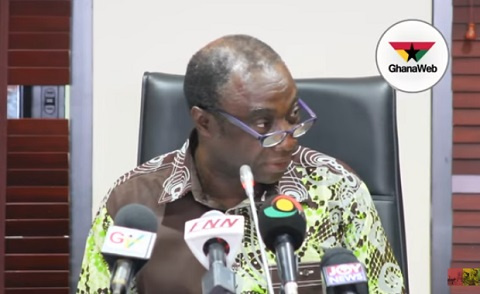The Member of Parliament for Pru East and former Minister of Power, Dr. Kwabena Donkor, has hit back at the World Bank Country Director to Ghana, Pierre Frank Laporte, indicating that he is mixing fairy tales with facts as far as the signed PPAs were concerned.
He made these comments while speaking in an interview with Accra-based Citi FM, which was monitored by GhanaWeb.
The comments by the MP followed an earlier assertion by Pierre Laporte, claiming that Ghana, under former President John Mahama, signed expensive power deals that are still costing the country money to service.
According to Kwabena Donkor, the country director is only fuelling his political ambition and not speaking about the facts of the case.
“I totally disagreed and will rather call the gentleman a partisan politician than a World Bank Country Director, because that is what he is posing to be. This is somebody who was the minister for finance in the Seychelles Republic, he was a minister for trade, he was the governor of the Central Bank, and he is a presidential aspirant. He needs friends in the sub-region and therefore I am not surprised that he is mixing fairy tale with facts,” he said.
The former minister went on to explain that there is no excess capacity as claimed by the country director.
“The fact of the matter is that if you take the 2022 Energy Commission Projected National Energy demand, there was hardly any excess capacity. In fact, in some months we were eating into our reserves, our redundancy. So, the issue of excess capacity is a green hearing and that should be discounted,” he added.
Background:
Pierre Frank Laporte, the World Bank (WB) Country Director to Ghana, said that Ghana’s energy sector debt is a major contributor to the country’s debt woes.
In an interview monitored by GNA, the country director indicated that his outfit identified certain factors that were driving the country’s debt situation.
According to Mr Laporte, one of the factors the bank has identified is the energy sector.
He said the deficiencies in the sector characterized by the tariff systems and management issues coupled with expensive power purchases by the state in addition to the transmission losses, were the major problems in the energy sector driving Ghana’s debts.
He said the mismatch between the production cost of the Independent Power Producers (IPPs) vis-à-vis how much consumers paid led to an upsurge of debts since the Government could not make financial commitments to them (IPPs).
Mr Laporte also said the Power Purchasing Agreements (PPAs) the Government had signed were expensive. In addition to the exorbitant power purchases the country was paying for energy it does not use due to the “take or pay contracts.”
He asked the Government to pursue some reforms in the areas of tariff adjustments, addressing the transmission losses through improved infrastructure and restructuring the power purchasing agreements consistent with the energy demands of the country to reduce a significant portion of the debts.
The WB Country Director acknowledged the progress made thus far via the recent increment and subsequent approval in tariff by the Public Utility Regulatory Commission (PURC), saying much could be achieved if the intended reforms in the energy sector were implemented.
He subsequently advised the Government to take advantage of the West African Power Poll, to provide cheap electricity for its people and industry.
According to the Fitch Ranks, the energy sector is the biggest driver of the national debt as the West African Country currently owes independent power producers to the tune of $ 1.58 billion.
Fitch Ranks also says the country had initially reached out to the IPPs to restructure their debts in view of the External and Domestic Debt Restructuring but the companies objected to the proposal.
Source: ghanaweb.com




